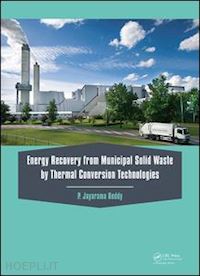1 Waste Generation & Management 1.1 Introduction 1.2 Waste generation 1.3 MSW management system 1.3.1 Waste hierarchy 1.3.2 Recycling & energy recovery 1.3.3 Markets for secondary materials 1.3.4 Global policy trends 1.3.5 Municipal waste, a source of clean energy 1.3.6 Energy-from-Waste technologies2 Combustion Technology 2.1 Introduction 2.2 Benefits & issues 2.3 Chemistry of combustion 2.4 Efficiency of combustion 2.5 Process stabilization & combustion control 2.6 MSW incinerator systems 2.6.1 Grate technology 2.6.2 Fluidized bed combustion technology 2.6.3 Refuse-derived fuel combustion 2.6.4 Suppliers of the facilities 3 Pollutants and Residues from Thermal Treatment 3.1 Introduction 3.2 Formation of pollutants 3.3 Flue gas cleaning/control systems 3.3.1 Particle (PM) removal 3.3.2 Gaseous contaminants removal 3.3.3 Heavy metal and dioxin/furan removal 3.3.4 Nitrogen Oxide Removal 3.3.5 Spray Drying Absorption (SDA) 3.3.6 Dry sorbent injection 3.3.7 Moisture condensation in gas cleaning systems 3.4 New developments in flue gas cleaning 3.4.1 Alstom’s NID (Novel Integrated Desulfurization) system 3.4.2 Lurgi Lentjes Circoclean process 3.4.3 Combined scrubbing process by Forschungszentrum Karlsruhe 3.5 Energy & water consumption 3.6 Management of residues 3.6.1 Treatment & use of bottom ash 3.6.2 Treatment and use of APC residue 4 Pyrolysis and Gasification Technologies 4.1 Introduction 4.2 Pyrolysis 4.2.1 Pyrolysis reactors 4.2.2 Investigations on pyrolysis of MSW 4.2.3 Plusses and minusses of the process 4.2.4 Utilization of the process products 4.2.5 Commercial scale pyrolysis plants 4.3 Gasification 4.3.1 Conventional gasification 4.3.2 Chemical reactions in gasification 4.3.3 Key factors for gasification of waste 4.3.4 Gasifier configurations 4.3.4.1 Fixed bed gasifiers 4.3.4.2 Fluidized bed gasifiers 4.3.4.3 Slagging gasification 4.3.5 Performance criteria 4.3.6 Tar content in syngas 4.4 Plasma gasification 4.4.1 Plasma arc gasifier 4.4.2 Alter NRG/Westinghouse plasma gasification process 4.4.3 Example of a thermal plasma facility 4.4.4 Plasma technology for treatment of incinerator residues & hazardous waste 4.4.5 Issues with plasma arc gasification 4.5 Commercial status of gasification 4.6 Gasification plants in operation 4.7 Energy recovery from plastics 4.7.1 Recycling of plastic waste 4.7.2 Thermal decomposition of plastics 4.7.3 Technologies for energy recovery from plastic waste 4.7.3.1 Laboratory-scale pyrolytic gasification technique 4.7.3.2 Laboratory-scale pyrolysis of segregated plastic waste 4.7.3.3 Demonstration-level liquid fuels production from plastic pyrolysis 4.7.3.4 Production of gaseous fuel 4.7.4 Commercial systems 4.7.5 Fuel properties of pyrolytic oils 5 MSW thermal conversion plants: Case Studies 5.1 AEB, Amsterdam, The Netherlands 5.2 Isseane power plant, Paris, France 5.3 Zabalgarbi plant (Sener-2), Bilbao, Spain 5.4 Riverside plant, Belvedere, London, UK 5.5 Case studies from Japan 5.6 Allington energy from waste facility, Kent, UK 5.7 CHP waste-to-energy plant, Reno-Nord, Aalborg, Denmark 5.8 Waste incineration plant, Arnoldstein, Austria 5.9 The Mainz waste-to-energy plant, Germany 5.10 Indaver integrated MSW treatment plant, Doel (near Antwerp), Belgium











